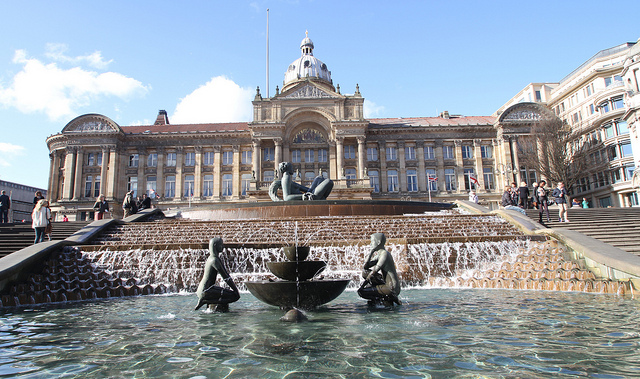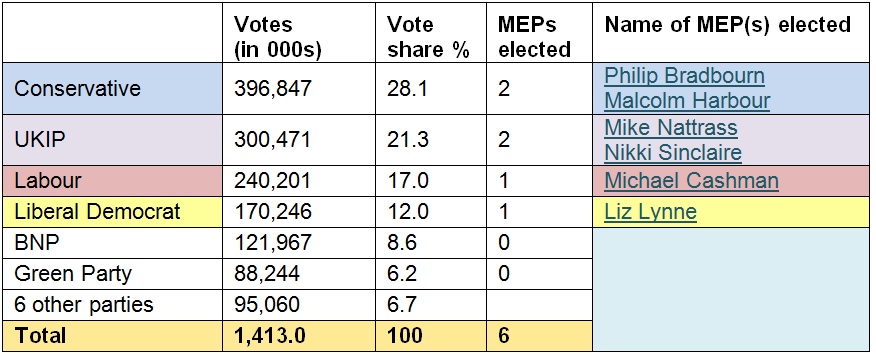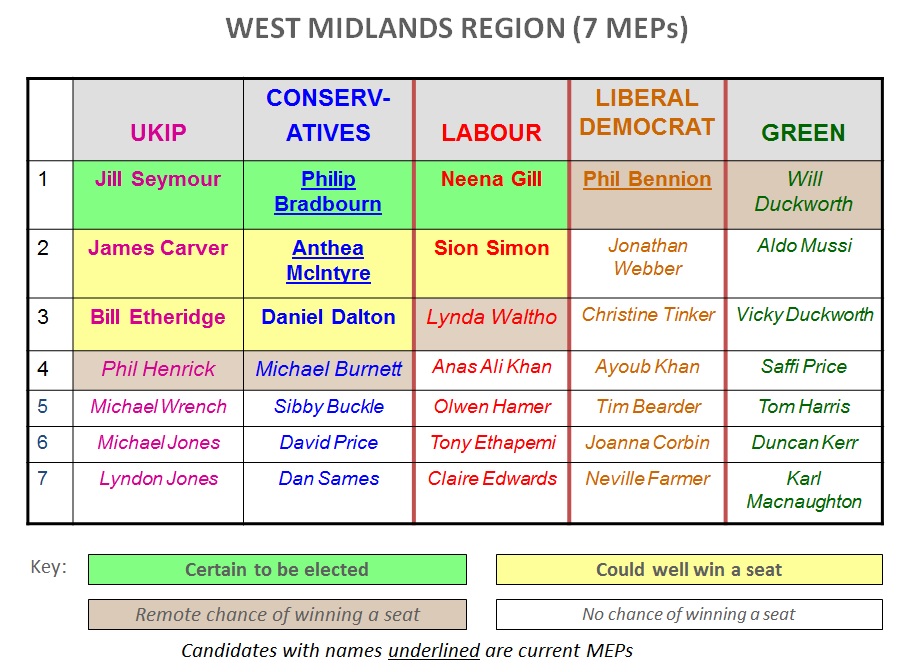Euro elections – what can we expect to happen in the West Midlands?
In 2009 the West Midlands constituency elected six Members of the European Parliament, but under the provisions of the Lisbon Treaty this year it will elect seven. Previewing the forthcoming election, the Democratic Audit team show that UKIP are likely to finish first in this region, picking up at least two and perhaps three seats, the Conservatives stable and Labour recovering. The Liberal Democrats’ foothold in the region looks precarious.
This region is one of the country’s most political diverse, with large cities such as Birmingham and Coventry traditionally friendly to Labour, and rural areas like Warwickshire hospitable to the Conservative Party. The region is seen as crucial in deciding UK elections, and is fiercely contested at local, national, and European level. Traditionally the West Midlands has principally been a Labour versus Conservatives battleground in Westminster politics. But in Euro elections the Tory plus Labour share of the vote has declined from 65% in 1999 to less than 45% in 2009. UKIP has tended to do well in the region, beating Labour into third place last time, despite there also being a quite strong British National Party vote.
In 2009, Table 1 below shows that the Conservative Party topped the poll with 28 per cent of the vote, and duly saw two MEPs elected. UKIP also returned two MEPs after finishing second on 21%. Labour had a disappointing year at the height of the recession, hanging on to only a single MEP, the same as the Liberal Democrats, for whom this is not a region of strength. The Greens scored only an average vote share for them, and were never in contention to win a seat. Under the Lisbon treaty, the UK gained extra MEPS, and in the West Midlands a ‘virtual’ MEP was awarded to the Conservative Party, meaning that in principle there are defending three MEPs.
Table 1: what happened last time, June 2009
Note: Our vote data are rounded to the nearest thousand votes. Exact 2009 results are available from UK Polling Report here. Of the MEPs elected in 2009, only Philip Bradbourn is standing for re-election under the same party banner. He will be joined by Anthea McIntyre, who was later added to the constituency’s MEPs. For the Liberal Democrats, Phil Bennion took over from Liz Lynn in 2012 (when she stood down), so he is also a (newish) incumbent.
What could happen this time?
This year the polls show that UKIP are likely to be stronger than last time, benefiting from the likely collapse in the BNP vote and likely to gain some defectors from the other parties too. With seven seats in the region now, they will hope to both top the poll and win three MEPs, though they can only be strongly confident of two. Neither of their previous winners are standing for the party again, one having been de-selected and the other having defected, a record that may not help UKIP much. The Conservatives will hope to hold onto their vote share against any UKIP surge, and can realistically aspire to retain two of their MEPs. They may perhaps be aided by the fact that their top two candidates are incumbent MEPs seeking re-election. Our simplified ballot paper below shows the likely candidates in contention.
Chart 1: simplified ballot paper
Labour are likely to recover strongly from their national low point in 2009, giving them a good chance of returning two MEPs – although they can only be certain of one at this stage. Their third candidate does not seem likely to win a seat, unless Labour runs strongly against the Conservatives and UKIP. The Liberal Democrats won 20% of the votes at the 2010 general election in this region, but they seem unlikely to perform strongly owing to their current collapse in the national polls. Their incumbent MEP Liz Lynne is not standing again, and Phil Bennion their new top candidate will have an uphill fight on her hands to hold on the party’s seat. The Green Party are would also need to run far more strongly than last time to stand any chance of winning a seat.
The top parties candidates


 Due to Mike Nattrass’s deselection and Nikki Sinclaire’s defection to the “We Demand a Referendum” party, UKIP will be fielding no incumbent MEPs. Therefore the number one UKIP candidate for the West Midlands constituency is Jill Seymour. She is a long-standking UKIP activist who has served on the party’s national committee. Her Twitter account is here. James Carver is UKIP’s second placed candidate for the West Midlands. He has worked for the party in a number of different capacities since the mid 1990s, including as an assistant to Nigel Farage. He is also a bespoke umbrella maker. His Twitter account is here. Bill Etheridge is third on the list. He is currently the regional organiser for the Campaign against Political Correctness, and a hospital governor. He is also UKIP’s Parliamentary candidate for the Dudley North constituency. His Twitter account is here.
Due to Mike Nattrass’s deselection and Nikki Sinclaire’s defection to the “We Demand a Referendum” party, UKIP will be fielding no incumbent MEPs. Therefore the number one UKIP candidate for the West Midlands constituency is Jill Seymour. She is a long-standking UKIP activist who has served on the party’s national committee. Her Twitter account is here. James Carver is UKIP’s second placed candidate for the West Midlands. He has worked for the party in a number of different capacities since the mid 1990s, including as an assistant to Nigel Farage. He is also a bespoke umbrella maker. His Twitter account is here. Bill Etheridge is third on the list. He is currently the regional organiser for the Campaign against Political Correctness, and a hospital governor. He is also UKIP’s Parliamentary candidate for the Dudley North constituency. His Twitter account is here.
Note: Although both Mike Nattrass and Nikki Sinclaire have left UKIP, both are standing as candidates at the election. More information about them can be found on Nattrass here, and Sinclaire here.


 The number one Conservative candidate is Philip Bradbourn. First elected as an MEP in 1999, he is seeking re-election for the fourth time. His Votewatch EU profile shows details of his attendance record, committee assignment and parliamentary activities here. The Tories second candidate is fellow incumbent Anthea McIntyre who was appointed to the European Parliament following the implementation of the Lisbon Treaty. Previously, she was a Management Consultant and businesswoman. Her Twitter account is here. Her Votewatch EU profile can be found here. Daniel Dalton is the Conservative Party’s third placed candidate. A former professional cricketer and a current policy adviser to the ECR group in the European Parliament, it seems unlikely that he can win against a UKIP surge and a Labour revival, despite the region’s extra seat this time. Fourth for the Tories on the ballot paper is Michael Burnett who appears in fourth place. he is a chartered accountant and has advised various MEPs on elements of economic policy. He has zero chance of winning.
The number one Conservative candidate is Philip Bradbourn. First elected as an MEP in 1999, he is seeking re-election for the fourth time. His Votewatch EU profile shows details of his attendance record, committee assignment and parliamentary activities here. The Tories second candidate is fellow incumbent Anthea McIntyre who was appointed to the European Parliament following the implementation of the Lisbon Treaty. Previously, she was a Management Consultant and businesswoman. Her Twitter account is here. Her Votewatch EU profile can be found here. Daniel Dalton is the Conservative Party’s third placed candidate. A former professional cricketer and a current policy adviser to the ECR group in the European Parliament, it seems unlikely that he can win against a UKIP surge and a Labour revival, despite the region’s extra seat this time. Fourth for the Tories on the ballot paper is Michael Burnett who appears in fourth place. he is a chartered accountant and has advised various MEPs on elements of economic policy. He has zero chance of winning.


 The West Midlands election list for the Labour Party will be topped by Neena Gill who was an MEP from 1999 to 2009, but failed to win a seat last time. Prior to becoming a Member of the European Parliament, she was Chief Executive of ASRA Group and the Newlon Housing Group. In her previous decade in the European Parliament she held a number of committee posts and external relations positions. More information about her time in the Parliament can be found here and her Twitter account is here. The second candidate on Labour’s list is Sion Simon who this time should have a good chance of winning. He was previously the MP for Birmingham Erdington (2001-2010) before stepping down to pursue an unsuccessful campaign for the Mayoralty of Birmingham. In Parliament, he was a Junior Minister in the Department for Innovation, Universities and Skills, and the Department for Culture, Media and Sport. More information about his time as an MP can be found here. His Twitter profile is here. Another former MP Lynda Waltho is third on Labour’s list for the European Parliament elections. She was the Member of Parliament for Stourbridge between 2005 and 2010, and previously served as a member of a number of committees, and as an Assistant Regional Minister. More information about her time in Parliament can be found here, and her Twitter account is here, but she stands little realistic chance of being elected, short of a Labour landslide.
The West Midlands election list for the Labour Party will be topped by Neena Gill who was an MEP from 1999 to 2009, but failed to win a seat last time. Prior to becoming a Member of the European Parliament, she was Chief Executive of ASRA Group and the Newlon Housing Group. In her previous decade in the European Parliament she held a number of committee posts and external relations positions. More information about her time in the Parliament can be found here and her Twitter account is here. The second candidate on Labour’s list is Sion Simon who this time should have a good chance of winning. He was previously the MP for Birmingham Erdington (2001-2010) before stepping down to pursue an unsuccessful campaign for the Mayoralty of Birmingham. In Parliament, he was a Junior Minister in the Department for Innovation, Universities and Skills, and the Department for Culture, Media and Sport. More information about his time as an MP can be found here. His Twitter profile is here. Another former MP Lynda Waltho is third on Labour’s list for the European Parliament elections. She was the Member of Parliament for Stourbridge between 2005 and 2010, and previously served as a member of a number of committees, and as an Assistant Regional Minister. More information about her time in Parliament can be found here, and her Twitter account is here, but she stands little realistic chance of being elected, short of a Labour landslide.
 The top Liberal Democrat candidate in the region is a recent incumbent Phil Bennion MEP who has been an MEP since early 2012 when (as second on the party’s 2009 list) he was automatically given Liz Lynne’s seat upon her decision to step down. His Votewatch EU profile can be found here. Previously a farmer, his chances of retaining his seat look quite dicey, unless he can gain at least 10 per cent of the vote. The West Midlands Liberal Democrats activist Jonathan Webber is second on their list. He stands virtually no chance of being elected.
The top Liberal Democrat candidate in the region is a recent incumbent Phil Bennion MEP who has been an MEP since early 2012 when (as second on the party’s 2009 list) he was automatically given Liz Lynne’s seat upon her decision to step down. His Votewatch EU profile can be found here. Previously a farmer, his chances of retaining his seat look quite dicey, unless he can gain at least 10 per cent of the vote. The West Midlands Liberal Democrats activist Jonathan Webber is second on their list. He stands virtually no chance of being elected.
 The Green Party list is headed by their party Deputy Leader Will Duckworth. He is a Councillor for the Party in Dudley, making him the first Green councillor in the Black Country. His Twitter account is here, but he will have to do exceptionally well to have any chance of being elected.
The Green Party list is headed by their party Deputy Leader Will Duckworth. He is a Councillor for the Party in Dudley, making him the first Green councillor in the Black Country. His Twitter account is here, but he will have to do exceptionally well to have any chance of being elected.
—
The West Midlands contains the counties for Shropshire, Staffordshire, Warwickshire, Worecestershire, and the metropolitan country known as the East Midlands (this contains the metropolitican districts of Birmingham, Coventry, Dudley, Sandwell, Solihull, Walsall, and Wolverhampton. Additionally the region contains the Shropshire, Helford and Wreckin, and Stoke on Trent Unitary Authorities.
—
Note: Please read our comments policy before posting. The shortened URL for this post is: https://buff.ly/Rk8HFu








 Democratic Audit's core funding is provided by the Joseph Rowntree Charitable Trust. Additional funding is provided by the London School of Economics.
Democratic Audit's core funding is provided by the Joseph Rowntree Charitable Trust. Additional funding is provided by the London School of Economics.
maillot football 2014
Thanks-a-mundo for the blog.Really thank you! Will read on…
A look at parties and candidates for the West Midlands seats in tomorrow’s #EUvote from @democraticaudit https://t.co/gyUiDYaiic
Euro elections – what is likely to happen in the West Midlands? https://t.co/dGBYdRC7Ed and in the East Midlands? https://t.co/ULPW5KF2Mz
@DemocraticAudit are running a series previewing the EU elections by region. What can we expect in the West Midlands? https://t.co/gfbwcQkGvw
The article largely ignores the We Demand a Referendum party, who have been campaigning hard in the West Midlands, where Nikki Sinclair MEP enjoys high recognition. I believe this party should have been added to Chart 1 – Simplified ballot paper and Nikki be placed in the remote chance of winning a seat category – I can see one scenario where she comes 6th or 7th in this election.
Simon Sharpe-Foster, Head of Politics, Birmingham Metropolitan College, West Midlands.
@NSinclaireMEP – you’re going to be livid, they didn’t even put you on the table in the middle of the article! https://t.co/r3Rk2M41RP
Euro elections – what can we expect to happen in the West Midlands? : Democratic Audit UK https://t.co/pnPp9EUk6S
Euro elections – what can we expect to happen in the West Midlands? https://t.co/7qEJdPBTl5
Euro elections – what will happen in the West Midlands? https://t.co/NWlPFJMkLU